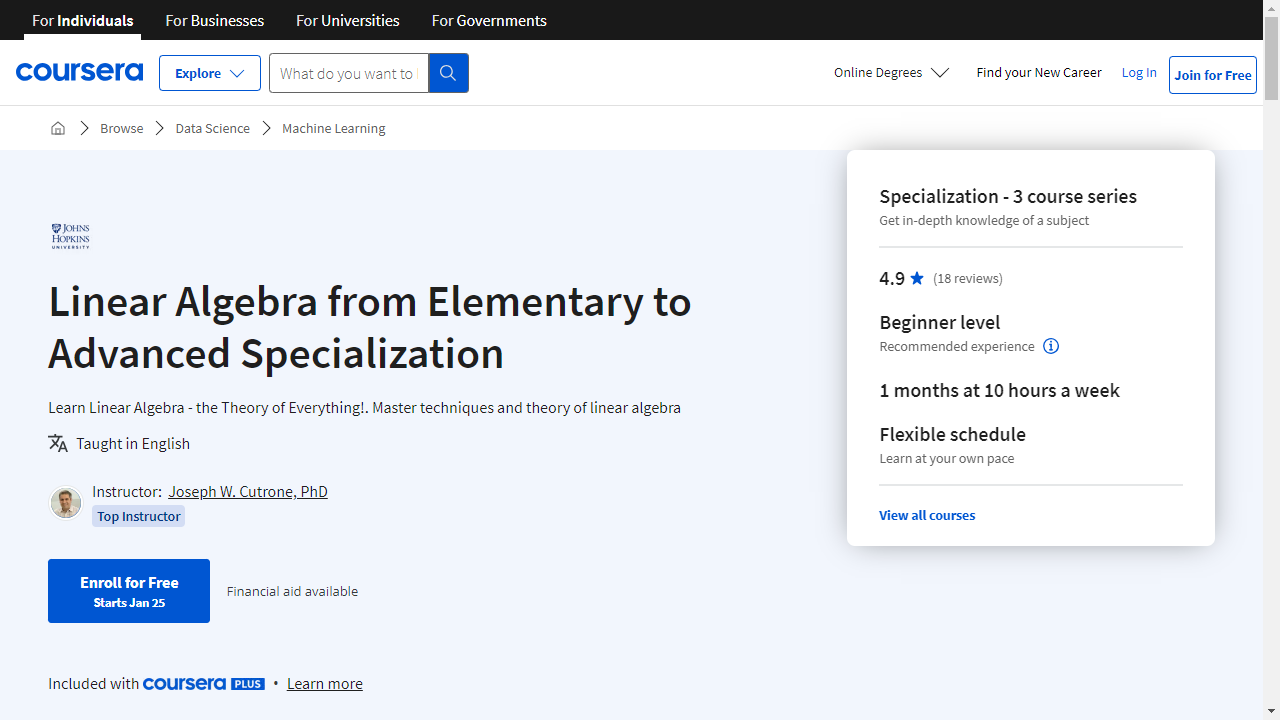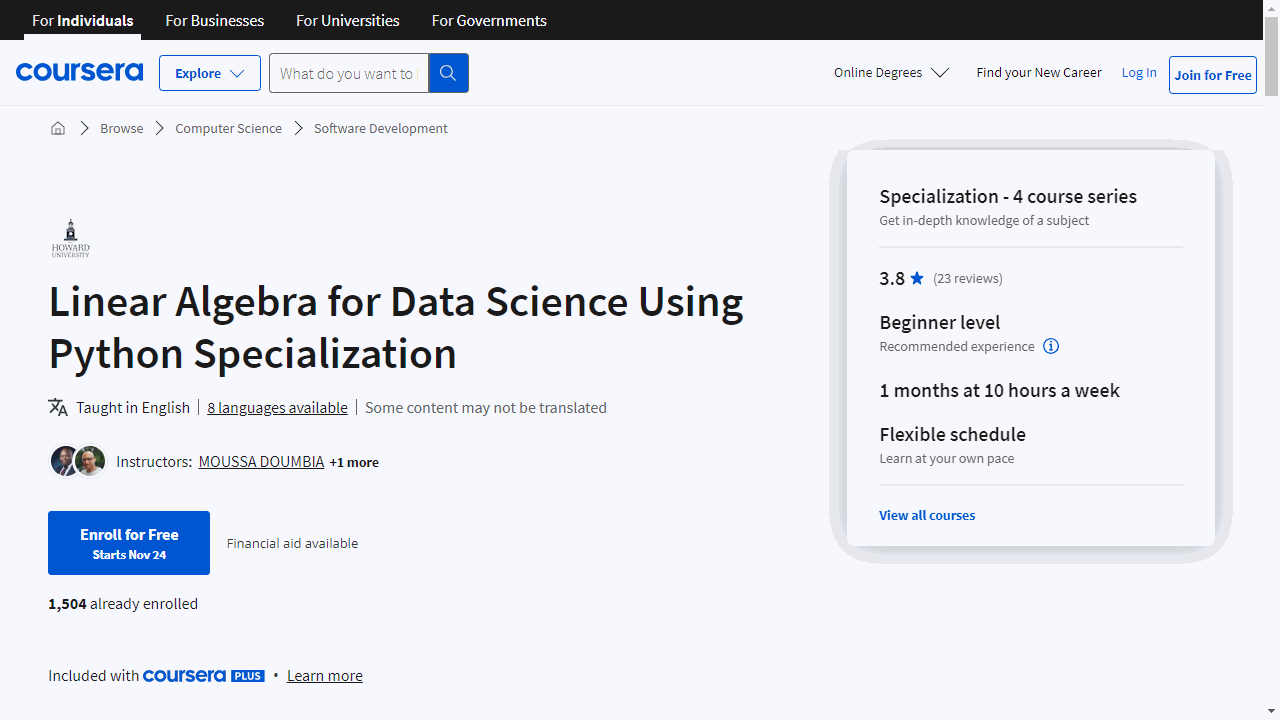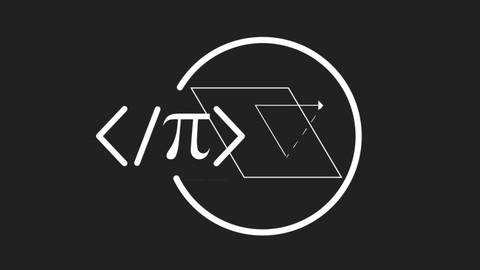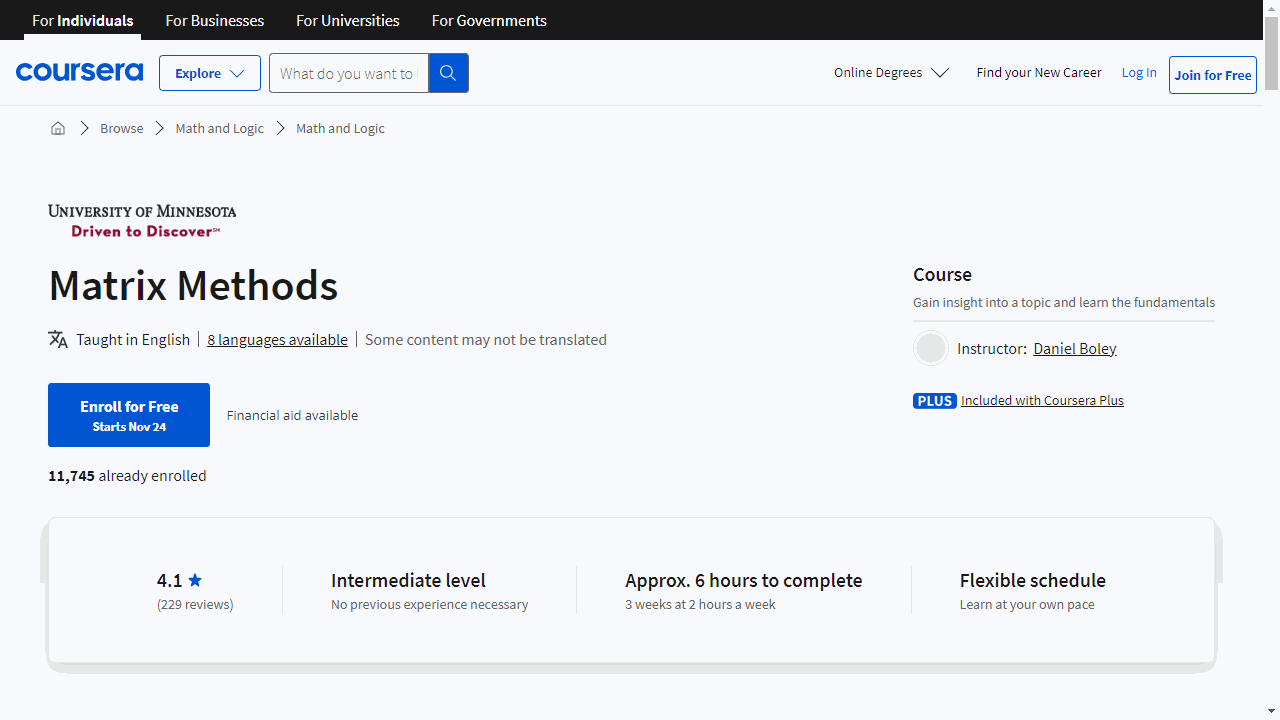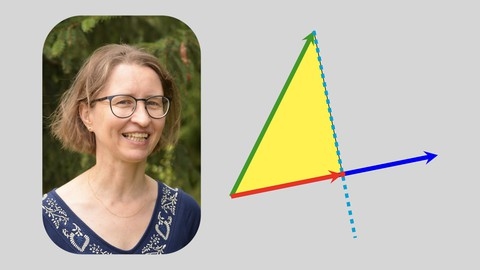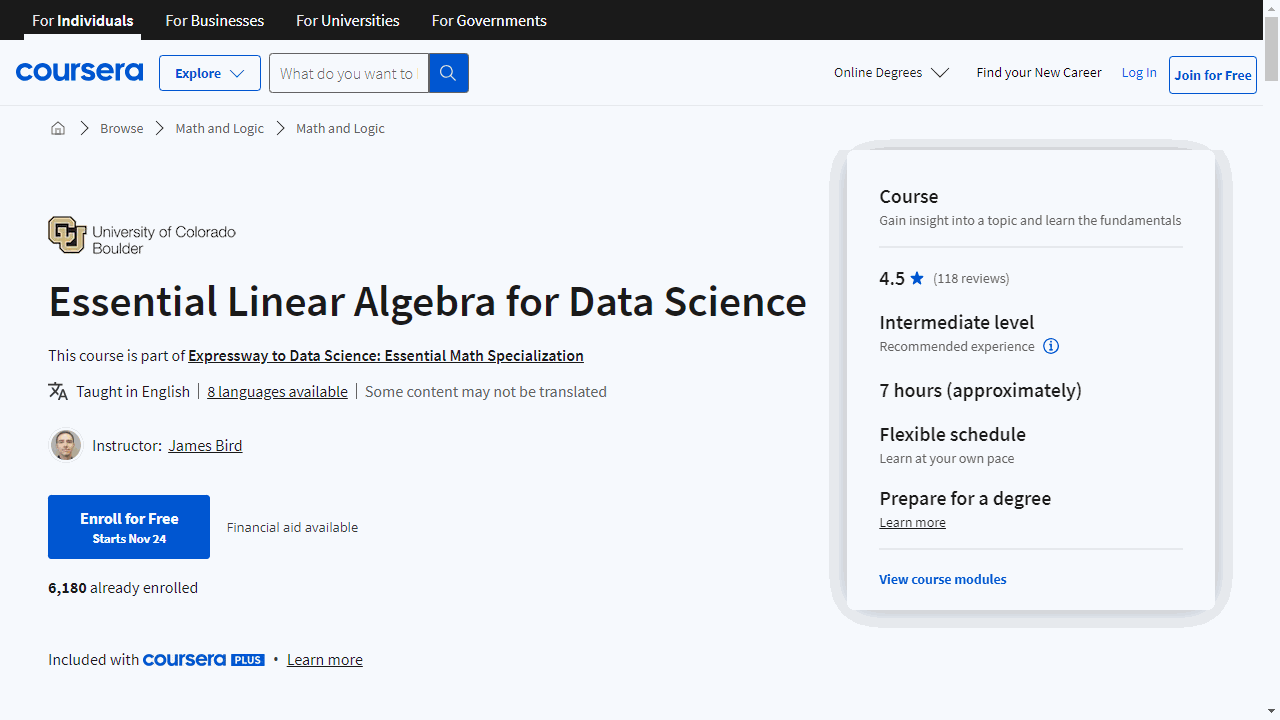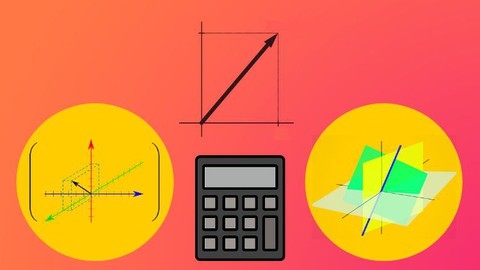Linear algebra is a foundational branch of mathematics that deals with vectors, matrices, and systems of linear equations.
Its applications are far-reaching, impacting fields like computer science, engineering, physics, and even economics.
By mastering linear algebra, you gain a powerful tool for solving complex problems, understanding data transformations, and building advanced algorithms.
Whether you’re a student, a professional, or simply a curious learner, a solid understanding of linear algebra can open doors to new opportunities and deeper insights.
Finding a comprehensive and engaging linear algebra course can be challenging, with numerous options available online.
You’re looking for a course that strikes the right balance between theory and practice, offering clear explanations, practical examples, and maybe even some hands-on exercises to solidify your understanding.
For the best linear algebra course overall, we recommend Linear Algebra from Elementary to Advanced Specialization on Coursera.
This specialization offers a structured path from foundational concepts to advanced topics, covering vectors, matrices, eigenvalues, eigenvectors, and more.
It provides a comprehensive understanding of linear algebra, preparing you for further studies or applications in various fields.
However, this is just one of the many excellent linear algebra courses available.
Keep reading to explore other top-rated courses, catering to different learning styles and focusing on specific applications of linear algebra, such as in data science or machine learning.
Linear Algebra from Elementary to Advanced Specialization
Provider: Coursera
This specialization is a great way to master the powerful tool that is linear algebra.
You will start with the fundamentals, learning how to work with linear equations and matrices before diving into the relationship between linear equations and analytical geometry.
This foundation will allow you to confidently approach more abstract concepts, reading, writing, and even correcting mathematical proofs.
The journey continues as you delve deeper into the world of matrices.
You will discover how to manipulate them algebraically to efficiently solve systems of linear equations.
You will also explore the fascinating realm of eigenvalues and eigenvectors, learning how these concepts play a crucial role in understanding matrix transformations.
These concepts are not just theoretical; you will see their practical application in areas like data science and machine learning.
Finally, you will explore the world of orthogonal vectors and their applications.
You will study orthogonal transformations and bases, gaining insights into how they are used to solve problems in various fields.
The specialization culminates with the study of symmetric matrices, bridging the gap between their algebraic properties and geometric interpretations.
This knowledge will equip you to understand how these matrices are used to analyze and interpret data in fields like AI and machine learning.
Become a Linear Algebra Master
Provider: Udemy
In this course, you will embark on a journey through the world of linear algebra, starting with the fundamentals of matrices and vectors.
You will learn how to perform operations on them, such as addition, subtraction, and multiplication.
Imagine matrices as grids of numbers and vectors as arrows pointing in space.
You’ll master techniques like Gaussian elimination to solve systems of equations, which is like cracking a numerical code.
You will then delve deeper into the world of vectors, understanding how to manipulate them using dot products and cross products.
Think of dot products as a way to measure how much two vectors align, and cross products as a way to create a new vector perpendicular to the original two.
You’ll learn how to find angles between vectors, equations of planes, and explore important inequalities that govern their relationships.
As you progress, you’ll discover the power of matrix-vector products and how they relate to concepts like null spaces and column spaces.
Imagine these spaces as hidden structures within matrices that reveal important information about their behavior.
You’ll then move into the fascinating realm of transformations, learning how matrices can represent these changes in vectors, like rotations, projections, and even combinations of transformations.
Finally, you will uncover the secrets of eigenvalues and eigenvectors, which are like the DNA of a matrix.
These special properties unlock a deeper understanding of how matrices behave and can be applied to solve a wide range of problems.
From solving systems of equations to understanding geometric transformations, this course will equip you with the tools and knowledge to tackle challenges in various fields.
Linear Algebra for Data Science Using Python Specialization
Provider: Coursera
This “Linear Algebra for Data Science Using Python” specialization on Coursera is a great way to start your data science journey.
You’ll build a strong foundation in linear algebra, a crucial area for data science.
The courses cover everything from the basics of systems of linear equations and matrix operations to more advanced concepts like matrix algebra and linear transformations.
And you’ll learn to use Python, a powerful programming language, to apply these concepts.
You’ll then explore regression models and how they’re used in data analysis.
This includes understanding the Method of Least Squares, a technique used to find the best-fitting line through a set of data points.
You’ll learn how to apply this method both by hand and using Python.
The specialization culminates in a Capstone project where you’ll apply your knowledge to a real-world data science problem.
This will give you a chance to use linear algebra and Python to analyze data, build a regression model, and present your findings.
This specialization offers a well-structured learning path from foundational concepts to practical application.
You will gain a solid understanding of linear algebra and how it’s used in data science, preparing you to tackle real-world data challenges.
Complete linear algebra: theory and implementation in code
Provider: Udemy
This course thoroughly explains linear algebra, covering both the theory and how to use it with code.
You’ll start with the basics of linear algebra, like vectors and matrices, and learn how to work with them.
You’ll develop a strong understanding of vector spaces, including how to calculate the span of vectors and determine if they are linearly independent.
You’ll also explore the concept of matrix rank, learn how to calculate it, and discover how it impacts other matrix operations.
You’ll then dive into matrix spaces, uncovering the four fundamental subspaces of a matrix: column space, row space, null space, and left null space.
You’ll discover how to solve systems of equations, a fundamental skill in linear algebra, using techniques like Gaussian elimination and converting the matrix to echelon form.
The course then introduces you to matrix determinants and inverses.
You’ll uncover the properties of each, their applications, and different ways to calculate them.
As you progress, you’ll explore projections and orthogonalization, including the Gram-Schmidt procedure, and learn how to use them to orthogonalize matrices.
You’ll also learn about QR decomposition, a valuable tool for solving linear equations, computing matrix inverses, and exploring the fascinating world of eigendecomposition and singular value decomposition (SVD).
You’ll see how eigendecomposition is related to matrix powers and learn how to use the SVD to break down any matrix, not just square ones.
Finally, you’ll explore the concept of quadratic forms and their applications in geometry and statistics, including principal component analysis (PCA).
Matrix Methods
Provider: Coursera
This course on Matrix Methods provides a solid understanding of matrices and their applications.
You’ll begin with the basics of matrices, learning about matrix multiplication, a fundamental operation used throughout the course, and matrix transpose.
You’ll then delve into systems of linear equations, exploring techniques like LU Decomposition and the Gaussian Elimination Algorithm to solve them.
These methods are essential for tackling real-world problems, and you’ll even learn to implement them using Python and Numpy.
The course then explores advanced concepts, including orthogonality and its role in finding the best fit for data using Linear Least Squares.
You’ll explore powerful techniques like Singular Value Decomposition (SVD) and learn how it’s applied in areas like Latent Semantic Indexing for analyzing large datasets.
Linear Algebra and Geometry 1
Provider: Udemy
This Linear Algebra and Geometry course begins with the essentials, guiding you through coordinate systems, vectors, and the core principles of linear transformations.
You’ll master the art of matrix manipulation, from addition and subtraction to multiplication and finding inverses, all while uncovering the power of Gaussian elimination and Gauss-Jordan elimination for solving systems of equations.
As you delve deeper, you’ll explore determinants, unlocking their ability to determine the invertibility of matrices, a crucial concept in linear algebra.
The course then expands your understanding to encompass vectors in n-dimensional spaces, a concept widely used in fields like machine learning and computer graphics.
You’ll grasp the intricacies of the dot product, enabling you to determine orthogonality and calculate projections, essential for understanding geometric relationships between vectors.
You’ll also master the cross product, a valuable tool for calculating areas of parallelograms and volumes of parallelepipeds, further strengthening your geometric intuition.
The journey culminates with a deep dive into the representation and analysis of lines and planes in both two and three dimensions.
You’ll learn to decipher their equations, understand their intersections, and calculate distances between them.
Along the way, you’ll encounter essential concepts such as the Pythagorean Theorem in R^n, Sarrus’ rule for calculating determinants, and the Vandermonde determinant, enriching your mathematical toolkit.
Through practical examples and applications in fields like physics, engineering, and computer science, you’ll develop a comprehensive understanding of linear algebra and geometry, preparing you to tackle real-world problems with confidence.
Essential Linear Algebra for Data Science
Provider: Coursera
This course guides you through the essentials of linear systems, showing you how to represent them with matrices.
You’ll master Gaussian elimination, a powerful method for solving these systems.
You’ll become proficient in matrix algebra, performing operations like addition, multiplication, and understanding the role of the identity matrix.
The journey continues with vectors, exploring how to combine them linearly and visualize their span.
You’ll grasp the concept of linear independence, determining if a set of vectors is essential or redundant.
The course then introduces linear transformations, demonstrating how these functions operate on vectors, changing their position and orientation.
You delve deeper into matrix inverses, learning how to “undo” the effects of a matrix.
You’ll discover how to calculate determinants and understand their significance in finding inverses.
Eigenvalues and eigenvectors are demystified, revealing their importance in understanding the behavior of linear transformations.
Finally, you’ll explore essential concepts like transposes, inner products, vector norms, orthogonal vectors, and orthogonal projections - all crucial for data science applications like machine learning.
Linear Algebra for Data Science & Machine Learning A-Z 2024
Provider: Udemy
This Linear Algebra course equips you with the fundamental math skills needed for data science and machine learning.
You’ll start with matrices, learning how to perform operations like addition, subtraction, and multiplication.
You’ll also find the inverse of a matrix, a crucial skill for solving systems of equations used to model real-world phenomena.
This foundation in matrices will prepare you for understanding advanced concepts like eigenvalues and eigenvectors, used in dimensionality reduction techniques like principal component analysis.
You’ll then delve into vector spaces, learning how to represent data points and create linear models using concepts like span, linear independence, and basis.
These concepts are key to understanding linear transformations and efficiently representing data in higher dimensions.
You’ll also explore the specific applications of identifying subspaces and null spaces to gain insights into the structure of your data.
The course doesn’t just focus on abstract theory; it provides a practical understanding of linear algebra.
You’ll learn about coordinate geometry, which helps with data visualization, and you’ll even get to explore functions and graphs, performing transformations like translations, stretching, and reflections.
The course also provides opportunities to apply these mathematical concepts to real-world problems in data science and machine learning, ensuring a well-rounded understanding of the subject.
Also check our posts on:
